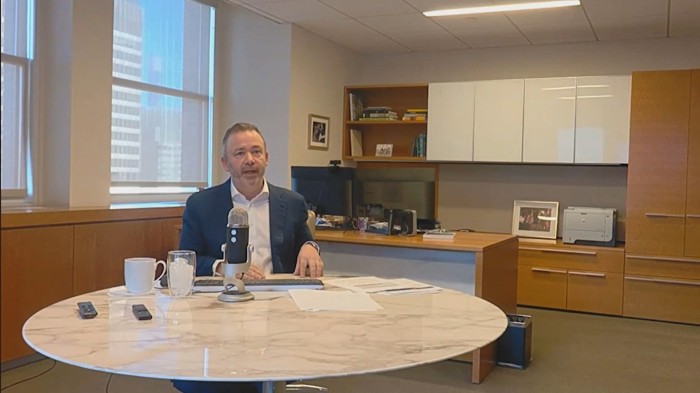Stay informed with free updates
Simply sign up to the Fund management myFT Digest — delivered directly to your inbox.
Boaz Weinstein’s webcast on Tuesday was a lot. Railing against fund managers’ “ecosystem of greed”, the hedge fund founder described his attempted coup at seven UK investment trusts in similar terms to a mercy mission.
Weinstein also talked about his time at Deutsche Bank (where he lost $1.8bn during the GFC) and his affinity with London, while still doing very American things like caring about The Guardian’s City coverage and repeatedly referencing “Aren’t You Embarrassed?”, a 2014 Netflix special by Chicago stand-up comedian Sebastian Maniscalco. At around the one-hour mark, Weinstein described Janus Henderson’s push in 2022 to liquidate Nelson Peltz’s Trian Partners as a Shakespearean revenge tragedy. It was quite the trip.
One of the recurring themes was misinformation. Weinstein said he’d been “quite shocked” that the UK press has defended an “old boy’s club” of managers by using data that is “plainly wrong”. To him, showing the performance of trusts over periods other than three years is “misdirection”. Criticism of his firm, Saba Capital Management, is “jingoism”. Quoting the total annual expense figure from a Saba fund fact sheet is “literally lying”.
All the bluster distracts from his incontestable point: crap performance from UK trusts. Their investors have been paying too much for too little.
On this, we in the press agree. Gathering funds was easy during ZIRP and managers became complacent, so they didn’t respond quickly enough to rising interest rates and post-Brexit regulations. The wounds suffered are self inflicted, with boards to blame as much as fund managers. Even when the manager has delivered a decent return (such as with ESCT, per the slide below), a lack of hard targets from the board means NAV discounts persist.
So far, five of the seven funds targeted by Saba have made changes that should be shareholder-friendly, while several hundred peers have been put on alert. Better late than never.
What’s less convincing is Saba’s argument that a reboot of its US fund-of-funds model in the UK would improve matters further. Weinstein hasn’t detailed how his firm intends to shrink NAV discounts at the trusts he takes over. Commitments to keeping fees low are vague and, for all but one of the trusts, Saba hasn’t indicated the size and terms of cash exits.
Investment mandates would be expected to change in ways unknown. Here’s how Weinstein explained himself on yesterday’s call:
You know what I could do better? Not do what you’re doing! You could put it into gilts, you could put it into anything. I would put it in a benchmark before I would let you continue to run this fund. I can’t do better than this? Who could do worse than this!?
And here’s the slide he used to show the performance of Saba’s flagship Closed-Ends Fund ETF, which it compares against three peers rather than its benchmark, the S&P 500. (As we mentioned yesterday, the ETF’s annual report shows that since inception to Nov 30, and for all given timeframes, it lagged the S&P 500):

Saba’s two listed US closed-end funds offer another way to measure performance. Voya Prime Rate Trust became a Saba property in July 2020 and was renamed Saba Capital Income & Opportunities Fund. The Templeton Global Income Fund, now known as Saba Capital Income & Opportunities Fund II, switched ownership in February 2023 after a legal challenge. In both cases, Saba became manager 11 months after taking control.
The funds are not the cheapest, with total expenses ratios reported at 6.01 per cent and 3.24 per cent respectively, according to Morningstar data. And while total shareholder returns look OK against their primary benchmark, the iBoxx Liquid High Yield Index, the funds’ discounts to NAV persist:

“Weinstein’s prescription to the industry of tender offers to reduce discounts does not seem to have helped his two [US] funds relative to their peers,” said Sodali & Co, a corporate advisory firm, said in a note published last July. “What the tenders did do was help reduce the AUM of both funds by approximately 50 per cent, spreading the funds’ costs across an asset base that is now half of what it was.”
Weinstein conceded on yesterday’s call that management fees at some trusts might creep higher, which he suggested was not unreasonable when the new manager has skin in the game. He also talked about merging trusts while retaining private investments investors valued, namely SpaceX. (It’s 7.6 per cent of USA and 8.4 per cent of EWI.)
The details of how a trust holding unquoted investments might organise a cash exit will be worked out later, presumably, along with all the other details. With shareholder votes just a month away, it’s looking like a straight choice between “misinformation” and no information.
Further reading:
— UK investment trusts deserve a better enemy than Boaz (FTAV)
— Weinstein wants to be ‘white knight’ of UK stock market (FT)
— Investment trusts hit back against activist Boaz Weinstein (FT)



